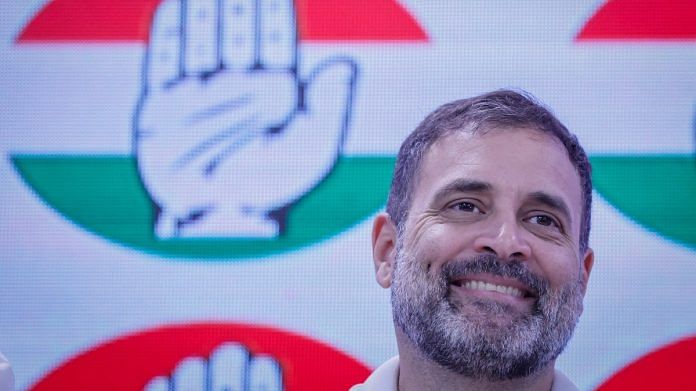Who is the real Rahul Gandhi? Is he a ‘pappu’? Is he a person still looking for the meaning of life? And why must he refine his political prowess at my expense as a voter? These were some of the questions posed by political journalist Aditi Phadnis during a talk at Delhi’s Press Club of India recently. And they echoed the popular sentiment toward the Congress leader’s journey. She was in conversation with senior journalist Sugata Srinivasaraju, at the launch of his book Strange Burdens: The Politics and Predicament of Rahul Gandhi. Srinivasaraju, who has also authored a book on former Prime Minister H.D. Deve Gowda, said that he does not try to judge Rahul Gandhi or put him in columns and wants to stay away from the binaries.
“My attempt with this book is exploration not excavation, which is why there is not a single line about his girlfriends in the book,” said the author and the hall, which was filled with senior journalists and political analysts, chuckled.
Capturing Rahul’s personality
The effort to understand someone as enigmatic as Rahul Gandhi isn’t new. In fact, it has been somewhat of a national passtime, tinged with some fawning fandom as well as frustration. Back in 2012, journalists Jatin Gandhi and Veenu Sandhu wrote a book called Rahul – The First Authoritative Biography. That book aimed to trace how Brand Rahul developed. At the time, he was 42 years old. It explored how modernity and his family’s political legacy mixed in his party. But things have changed a lot since 2012. We have seen the phenomenon of ‘pappuisation’ of Rahul, his step down as Congress president, and his attempts to revive his image through initiatives such as the Bharat Jodo Yatra. In this changing landscape, Srinivasaraju’s book claims a new perspective.
While there’s a plethora of books on Modi, there’s a noticeable scarcity when it comes to works on Rahul. Apart from the earlier mentioned books by Gandhi and Sandhu, Aarthi Ramachandran also penned Decoding Rahul Gandhi. Srinivasaraju’s book holds a unique position due to the significant time gap since the last publication. The timing aligns with Gandhi’s efforts to refurbish his image as a more poised and self-assured leader. The book also delves into the Bharat Jodo Yatra, which has recently sparked considerable discussion within political circles regarding its impact on Gandhi’s public perception.
But every few months, journalists and political observers cheer the emergence of a ‘new improved Rahul Gandhi’, only to discover that he has gone back into his shell after episodic performance. His on-and-off personality is fodder for endless analysis. Every book has tried to decode it. Srinivasaraju called it a predicament of its personality.
Divided in 11 chapters, the book attempts to explore the political journey of Rahul Gandhi. It starts with a caveat: “This book is not a biography. It examines and analyses Rahul Gandhi’s ideas, leadership, reason and emotion since he officially entered politics in March 2004”.
Also read: INDIA needs a new vision of nationalism for 2024. Invoking Nehru, Constitution not enough
He also mentioned how the book does not seek to answer questions of his suitability or unsuitability for a public role but is “rather about his circumstance, about how he is caught in the currents of history”.
As queries about his political ambitions and potential as a Congress party savior rose, Srinivasaraju tactfully admitted to not possessing the answers, aligning himself as an intrigued journalist keenly observing the unfolding narrative.
While the author talked about the spiritual side of Rahul Gandhi, the trauma of the assassination of his family members and how he brings these elements in his interaction, he also pointed out how the Congress leader has not yet developed an idiom to respond to the BJP.
“I am critical of his ideas…they’re half baked at times. He has not developed the idiom to reply to BJP. He is not very communicative, even Devegowda and EMS Namboodiripad were also not communicative…but they were not stuck like Rahul Gandhi. We hardly find statements where he says – “when we come to power”, instead he says things that are esoteric. For example, I want to restore peace that was earlier prevailing in the country.”, the author said.
When Srinivasaraju was asked about Gandhi’s role in the INDIA alliance, the author said that as per his knowledge, they do not think much of him, but are also afraid to say this out loud.
“I don’t think it is as straightforward a case for Rahul Gandhi to be made the prime ministerial candidate by the INDIA alliance”, said the author.
How is the book different
As we approach the 2024 elections, an interesting trend has emerged in the world of political literature. It seems that political biographies and books are gaining significant traction. Take, for instance, Neerja Chaudhary’s How Prime Ministers Decide and the recent biography of former PM Atal Bihari Vajpayee by Abhishek Chaudhary. It’s as if everyone wants to ride this wave.
There are also reservations around the timing of the book. Considering the Congress and the INDIA alliance are striving to counter the BJP’s influence, some cautioned against releasing the book. Their concern was that it might tip the balance, considering Rahul Gandhi’s potential impact on the alliance. The author, however, humbly downplayed this idea, stating that he doesn’t believe his writing holds that level of influence.
“I recall the words of W.H. Auden, who said that ‘poetry makes nothing happen, it survives in the valley of its making’,” the author said.
(Edited by Anurag Chaubey)



